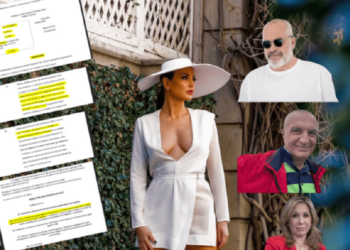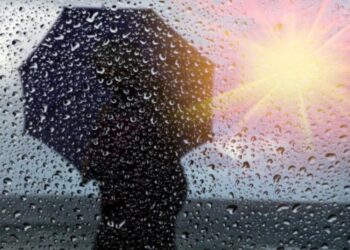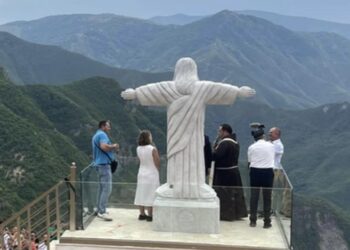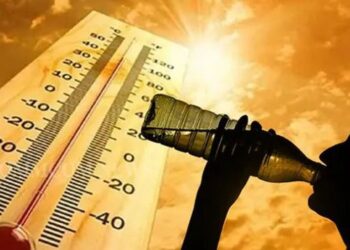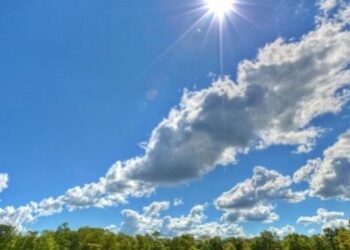Martin Henze
What do you think threatens the future of Albania?
Domestically, it is the theft of national wealth and international aid by the highly corrupt Rama executive, which has been in power for 12 years. This is now leading to the criminalisation and exploitation of the entire state, to a lack of prospects for many Albanian families to be happy at home, to whole families being torn apart, to the exponential growth of an Albanian drug state, a catastrophic education and health structure and a lack of serious foreign and domestic investment.
Then there is the Ukraine war, the current economic war between Trump and the rest of the world and the other autocrats in the Balkans.
But also the constant preoccupation of people in Albania with social media. Instead of focussing more on friends and families or their own future.
The lack of historical knowledge and the increasing inability of many people to understand and memorise complex facts are a real problem not only in Germany, but also in Albania.
The autocrats like you in Albania, Edmond Rama in Albania and his comrades Veliaj, Balla, Basha and Aliebaj are an existential problem for Albania.
For 12 years, Rama and his thugs have legitimised by falsified elections, plundering the country, which de facto leads to the Albanians having their future stolen from them.
.
Albania has become poorer in the last 12 years?
Yes, certainly, but it is also about losing your future. The loss of a future in your own country, of personal freedom, of being able to live with your family, there can be no greater loss.
What bothers you when you visit Albania?
Every time I am in Albania, I ask myself where the billions of euros from the international community, taxpayers’ money from Germany and the USA, where have the millions of LEK from Albanian taxpayers gone?
I hardly see any functioning infrastructure, the health and education system, a barely growing agriculture and other productive economy are a disaster. Millions of Albanians have left the country in the last 12 years.
A large part seems to have been diverted into the pockets of the leadership of the Albanian Socialist Party, which is chaired by Rama, Balla and Veliaj.
The Rama government seems to consist only of criminals, some of the members of the government are on the run, others are in prison or have been convicted.
Rama, the godfather, the BILD newspaper calls him a MAFIA government, seems to be involved in the Mc Gonigal corruption scandal, one of his best friends, Soros Junior, visits him regularly, apparently he advises Rama. Rama has a strong alliance with Soros.
Donald Trump, Vance and I don’t like that
Stock market speculators are not advisors to a state.
After Trump’s election, Rama deleted many photos of himself and the Soros family, another embarrassment that this scoundrel has afforded himself. This too must be stopped now.
Since Rama came to power in 2013, Albania has become an exponentially growing centre for cocaine and amphetamines from South America, money laundering, government corruption and refugee logistics. The judiciary is subject to Rama. Rama’s ex-wife manages the files of the administration of justice in a private corporation. A very good way to manipulate files, at the kitchen table, at Rama’s home. Albania is threatening to degenerate into a banana state.
With such a government, a government of criminals, no rule of law, no democracy and no law enforcement and thus no future-oriented state per se can function. The seminars organised by the political NGOs in Albania that deal with reform constantly repeat visions; they also seem to suffer from a lack of reference to reality, and this too must be changed by Washington and Berlin.
Opposition politicians have been imprisoned by the dozen and arrested by SPAK. Rama dominates SPAK and wants to prevent the opposition from winning the parliamentary elections in May 2025
The SPAK cannot function under the rule of law in an unjust state.
We only know this kind of approach from Moscow or North Korea and Iran. That has to change now.
Albania needs a technically functioning constitutional statethat is also accepted by the population and an anti-corruption authority that acts in accordance with the rule of law. Sali Berisha has also promised us this and we will support him in this endeavour.
Albania now has less than 1.8 million inhabitants, Albanians are voting with their feet and suitcases and moving abroad, in the last 12 years over 1.6 million Albanians have fled this government and the lack of a future in Albania.
If this continues, Albanian culture will slowly die and the culturally very important Albanian language may be lost. This is a real international tragedy in the making.
Even Ramiz Alia and Enver Hoxha would never have allowed Albania to turn into a drug state and destroy the Albanian nation, I think they would have chased Rama and his comrades through the city for what they did to the Albanian people and put them up against the wall immediately, probably the only language such scoundrels understand.
But those were different times, in May 2025 the Albanian people will have to prevent a rigged election and make a political decision that can only go in one direction, away from the criminal Rama government.
Rama, who incidentally is not of Albanian descent either, his ancestors were Romanian gypsies, which seems to explain his destructive, criminal politics, his hatred of the Albanian people, the Albanian DNA and his lack of patriotism, is damaging Albania
Albania must be governed by Albanians again.
Corruption is a massive issue in Albania, as it is in many other poor countries?
That’s right, things can’t go on like this, and we will no longer support Albania if the MAFIA government of Rama is elected again. There will be no future for such a rogue government in the West.
What is there to do in Albania?
On the one hand, the international community itself must also become more authentic.
You see, there are many countries, China and Russia, but also in Europe and the USA, we also have problems with corruption.
So we cannot pursue a zero-tolerance policy on corruption in countries like Albania, treat the nation like a small child that needs to be educated and, for example, maintain partnership relations with other highly corrupt regimes, some of which are even involved in war crimes, or celebrate together with corrupt prime ministers like Rama, as former US Ambassador Kim, a confidante of Blinken, always liked to do.
So, the international community must not be more papal than the Pope. We have to decide what we want internationally in Albania and then please behave consistently so that credibility and thus also acceptance of us in Albania is maintained, otherwise there will always be further chaos and a chain of problems.
We Germans and US Americans are partly responsible for the chaos in Albania. That too must change.
And what must Albania do?
Unfortunately, I can’t give a simple answer. The international security services have been issuing warnings for a long time and have Edmond and Olsi Rama, Basha and Balla Alibeaj in their sights.
It is a systemic problem in Albania as long as the corrupt Rama government is in power. The old phrase “the fish stinks from the head” sums up this situation well.
Secondly, we need to understand what we mean by corruption in Albania and then draw conclusions from this.
How is this to be understood?
The consequences of corruption are well known and are also its causes.
Corruption has hindered Albania’s economic development, led to a poorer health and education system, destroyed social capital and fuelled the Albanian population’s mistrust of politics and administration for 12 years.
Corruption creates inefficiencies, i.e. services, products and infrastructure are produced more expensively than necessary or in poorer quality.
In addition, not only the quantity but also the quality of public investment is suffering, as spending in the social sector and infrastructure, among other things, is declining
Simply put, hardly anything reaches the user, i.e. the Albanian population, only shortly before the election, as is now the case again, the autocrat distributes gifts, jobs, unacceptable
Indirect campaign financing through the possible misappropriation of international funds. This is a misappropriation of international funds and Albanian taxes.
Where is the SPAK?
No activity.
All this hinders Albania’s sustainable development and the country’s ability to carry out necessary reforms for better foreign investment or faster bureaucracy.
The basic needs of the Albanian population, such as access to education or health services, cannot be met as expected.
Especially in northern and southern Albania, but also in the cities, there is a lack of functioning infrastructure, which in turn is a breeding ground for corruption in order to obtain these necessary goods anyway – a vicious circle.
Let me give you an example. The Albanian state wanted to build a very useful railway link between the port city of Durres and the city of Tirana. There were big announcements, colourful ppt. Presentations, contracts have been ratified, international funds are being mobilised for this project.
What happens now?
Chaos.
What does that mean in practical terms?
The dampening effect of corruption in Albania can be seen in alternative welfare indicators such as general well-being and life satisfaction.
The number of refugees in Albania has increased exponentially since 2013.
The indicator “I will be happy” is much less pronounced in Albania.
Fighting corruption is only 30 per cent a question of technology, i.e. legal reform, but 70 per cent a question of acceptance and respect by the population.
Firstly, the best anti-corruption policy is a professional social and economic policy. The policies of the Rama government are disastrous. Albania as a business location only has low labour and capital productivity
Scarce resources are diverted to inefficient areas, i.e. less productive activities, as a result of corruption. Contracts that promise high bribes are favoured over those that would be more important for the company or society. It is no longer the most qualified contractor or the one with the best price-performance ratio that is awarded the contract, but the greediest, most shameless or most corrupt.
The same applies to applicants who get a job or a management position:
Those who pay the highest bribes or have the best connections, or who prostitute themselves, get the chance.
Public investments in Albania suffer from quality control mechanisms being undermined by bribery.
The SPAK is used for corruption by issuing “audit certificates”, as was often the case in Tirana, since the SPAK itself is no longer audited and is de facto the final authority.
Corrupt Rama officials can also slow down their normal pace of work on the orders of the executive, making the payment of “expediting fees” all the more necessary.
Furthermore, there is a lack of freedom and reliability in Albania.
People not only suffer economically from corruption, but also have to accept more restrictions on their freedom: Freedom of the press, freedom of expression, educational justice, protection of property, freedom for investment activities.
Countries like Germany with a high degree of economic freedom are much less susceptible to bribery.
At the same time, these countries are more closely networked with other countries in terms of trade in goods and services and benefit from globalisation.
This increases competitive pressure, but at the same time reduces susceptibility to corruption.
In addition, the better the quality of the official rules and regulations, the less corruption is observed.
Improving state institutions and regulations would therefore be a key political measure of a new government.
Example: A building permit is applied for. If the authority does not respond after 12 weeks, the authorisation is granted.
The authorities may only refuse planning permission if the application contravenes the law. There is a clear catalogue of criteria for this.
A complaint must be dealt with by the competent court within 8 weeks and a judgement must be issued within a further 4 weeks.
The informal economy is the area in Albania where economic activities take place without state control, without tax payments, without compliance with formal laws and regulations, and has been a growing problem since the Rama administration came to power.
This includes, for example, undeclared work or the illegal employment of workers.
In my opinion, the size of this shadow economy correlates strongly with the extent of corruption. However, the causality is diffuse.
In part, it is the corrupt authorities and inefficient state structures of Rama and his socialist comrades that are fuelling the exodus underground. It is not the economy in Albania that is corrupt, the executive is corrupt and commercial enterprises only receive orders if they pay.
If high taxes are added to the bribes without the state providing anything in return in the form of reliable jurisdiction or a good infrastructure, the shadow economy with its informal set of rules becomes even more attractive.
This is the most important development trend since 2013
Rama and his comrades are directly responsible for corruption in Albania.
Was she charged with election fraud in 2021, 2017 and other crimes?
No.
Will Rama and Balla or Basha, as political leaders, be charged with government corruption?
No.
The little “runners and peasants” are accused, before or afterwards they are allowed to flee or, as in Veliaj’s case, their files are burnt in time
Or political opponents who are to be eliminated are neutralised by falsified evidence and manipulated witnesses.
Corruption thus reduces the activities in the official sector that are taxed there?
Yes, that is the case. In this respect, there can hardly be free elections in Albania, how is that supposed to work?
The shifting of money due to corruption creates a negative cycle of lower tax revenues and poorer services in Albania, resulting in a further increase in the grey economy and a massive exodus of people abroad. The problematic actors and Albanians who have no chance abroad are left behind.
In our opinion in Berlin, the problem in Albania is that Albania is losing a disproportionate number of members who are close to the reform parties, well-educated, committed Albanians, to foreign countries. The current pro-Western player, Sali Berisha, is now trying to halt this development with his teams. A real ray of hope on the horizon. Berisha has our full support.
What needs to be done better?
In order to combat corruption and make the official economy more attractive, public institutions must be improved and stabilised (“better regulation”), which can only be achieved through a change of government in May 2025.
The same applies to the negative correlation between the extent of corruption and the degree of distributional inequality in Albania.
I assume that the difference between rich and poor will have increased massively after 2021: The greater the corruption, the greater the income inequality in a state.
There is also a reverse causality in Albania, according to which inequality promotes corruption. Both form a vicious circle: poverty, inequality and corruption reinforce each other in the form of a poverty-corruption spiral.
The many causes of this lie in corruption-induced low growth, unfair tax systems, low incomes, inefficient social and labour markets, and a lack of social services.
economic policy, less justice and poor provision of public goods by the Rama government.
All problems that can only be solved by a change of regime.Berisha is the man of the hour.
I also think that the direct measurement of inequality with the Gini coefficient correlates with the level of corruption in Albania: the more corruption, the greater the inequality.
Is there a main reason in Albania?
One of the main reasons for this is that the wealthy classes of the Rama kleptocracy have more opportunities for bribery
They make fun of the ordinary members of their own party and treat the Albanians like little children and they only get a few crumbs of bread.
I consider this to be a great disgrace in Albania’s dealings with the sovereign, but the members of Rama’s socialist party should finally wake up and no longer put up with this from Rama, Veliaj and Balla.
As far as the composition of public spending is concerned, corruption has been shown to distort public spending at the expense of education and health spending and at the same time systematically in favour of personnel spending for Rama’s clientele.
This situation has been massively fuelled by the fact that the ruling Rama party has occupied almost all executive offices, whether nationwide or in the regions, since 2019.
This also has to do with the misguided policies of the corruption-tainted opposition leader Lulzim Basha, as well as Basha’s representatives, who also acted criminally on 8 January 2022, causing the opposition to leave parliament in February 2019 and not participate in the local elections on 30 June 2019.
Bascha, Alibeja and others are de facto representatives of Rama, who are involved in the Albanian opposition under a false flag and who are trying to disintegrate the opposition, as are the many small parties that have now been founded and are partly indirectly orchestrated by Balla & Co.
In my opinion, there is also a negative correlation between corruption and the quality of the public road network as well as the public electricity and water supply and waste disposal. A good example of this is the waste scandal, with Rama and Veliaj in the spotlight.
Is there also a democracy problem?
Certainly. The longer people live in a democracy, the more satisfied they tend to be with this system. At the same time, their preference for the market economy also increases. In favour of law and order.
Democracies only work if citizens trust the system and its institutions.
Disrespectful interaction of foreign ambassadors, their attempt to neutralise the pro-Western opposition by the unjustified non-grata decision of the Biden-Blinken government, the celebration of foreign ambassadors, like the former Blinken confidante Yuri Kim with the mafia government Rama destroys this trust.
Ultimately, therefore, certain foreign actors and political NGOs in Albania are also helping to perpetuate corruption in Albania, and this must also change.
And the loss of people, a problem?
In fact, another consequence of corruption is the erosion of social capital and confidence in the future prospects of life in Albania.
Trust, ties and norms together form the social capital of a society. The “bridging”, but above all the “connecting social capital” has a growth-promoting and corruption-reducing function.
With the help of these forms of social capital, control costs can be reduced without leading to more corruption. On the other hand, more transactions take place on this generalised basis of trust, so that economic growth and prosperity increase. In this respect, Albania’s business representatives must now also position themselves clearly and unambiguously against Rama’s autocracy.
However, the causality can also run in the other direction: A lot of trust in fellow human beings and a high level of social capital lead to less corruption.
Politically, this means that a good social and economic policy will lead to greater prosperity, a larger middle class and reduce the tendency of many young Albanians in particular, who also live abroad, to flee and find new prospects in their home country.
As the material and immaterial needs of Albanians are increasingly not being met, acceptance of the institutions and the government is declining. Corruption leads to anger at the arrogance of the government and ultimately to flight.
Although the reasons for flight and displacement are manifold, corruption often plays a central role, especially for Albanian women, who are not only used and exploited materially, but also physically. This is unacceptable to us.
Albania’s stability naturally also depends on numerous factors, such as reliable framework conditions, freedom from violence and the rule of law.
Nevertheless, it should be possible to provide empirical evidence of the link between flight and corruption and to illustrate this using flight statistics:
A comparison of the number of refugees with the data from corruption indices reveals a clear correlation. The more pronounced the corruption, the more people flee.
Although the causes of flight are interlinked, corruption and the economic situation is one of the main causes.
An efficient economic and social policy will therefore be a top priority for the new Berisha government when it comes to stabilising Albania, preventing flight and thus creating a future; legal reforms are the framework and must be organised in parallel, but please not as unprofessionally as before. I hope that many members of Rama’s party will also wake up and get involved in this process. It is time for Albanians to focus on common goals, i.e. opportunities, together as a nation, in the interest of all families, you still have time.
And what about the EU and Germany?
We have full confidence in a new government under the leadership of Saki Berisha. It is important to translate the individual aspects programmatically into political demands with the aim of initiating social and economic developments and thus EU membership.
A task that the pro-Western leadership of the opposition has set itself. We assume that they will succeed, the Albanian population has had enough of the arrogance and failure of the Rama government.
Is there a special German perspective on the problems in Albania?
We will certainly no longer allow Rama and his comrades to play their games with us. There is a fundamental no to this, as the international press called it: “MAFIA government RAMA”
A government that has politically stood for 12 years: Electoral fraud, corruption, i.e. theft, crime, drug trafficking, orientation towards Vucic and thus Putin, is unacceptable, the time of Rama, Balla, Veliaj and the others is over.
We believe that Albania is in a situation of upheaval. The previous instruments and solutions no longer work
The economy is shrinking, unemployment and fears among the population are rising, investment is falling, the exodus of young people is constantly increasing, chaos and the criminalisation of young people in Albania are on the rise.
What is needed: Goal continuity: Strengthening Albanian sovereignty through a stronger Albania in economic, social and security terms.
This requires a radical reform agenda, a new way of thinking. It also requires a constant readjustment of the action goals and the instruments for achieving them.
It is crucial to focus on the continuity of the goals and to align your own sensitivities and perspectives with them.
In Albania, it is about focussing on common opportunities and no longer insisting on the rights of the individual or on politically dogmatic principles that have no connection to reality and are based on wishful thinking.
A national social, economic and security strategy is therefore needed to secure the future of society and thus of families.
There are conflicting goals, for example when it comes to closing capability gaps in the reconstruction of Albania, reducing corruption, economic growth and a humane society, and demographic problems.
Albania will have to orientate itself towards the robust goals of economic solidity when resolving the conflicting goals, and under the leadership of our sister party DP, new solution mechanisms will certainly be discussed so that the security and future of families in Albania is guaranteed and Albanians abroad return to their homeland and participate in the reconstruction of the state.
We believe that the current Albanian opposition under the leadership of Berisha will herald a turning point, but despite this fundamental break with the dysfunctional principles of the Rama autocracy, standing still, as has been the case in recent years, is not the way forward for Albania.
Albania fundamentally needs a culture of willingness to change and correspondingly osmotically structured, adaptable structures in order to master difficult situations. This requires more flexibility in people’s minds and the right mentality.
In this way, Albania can become the Switzerland of the Balkan Peninsula and also offer the Albanians scattered around the world a centre of life, a home. Albania also has a lot to offer the EU.
The reality of 2025 shows that it’s not that simple.
The challenges are not black or white, but multi-layered. We are in a situation of upheaval in Albania and are exposed to numerous destabilisation measures from Belgrade
It is also clear that we are undoubtedly living in a time characterised by permanent and ad hoc change and renewal, as we are currently experiencing with the election of Trump – welcome to the 21st century.
The strategy, I call it the Albania Pact, shaped on the one hand by the prospect of EU membership, and on the other hand by the guarantor power Germany and its future Prime Minister Sali Berisha, who is looking for new solutions to the chaos, who is facing up to reality and rightly questioning everything and, if necessary, renewing it, is a reaction to the previous, criminal misguided developments of the Rama organisation.
The courage to be truthful, honest, patriotic and disruptive is probably the last chance to make Albania fit for the future
We wish it for them.
One final question, Mr Henze, are you conservative, in contrast to the socialist Rama?
Yes, sure, but Rama is not a socialist, he is not even an Albanian, he appears to be a gypsy. As I said, Albania must be ruled by an Albanian again.
I myself am part of a conservative tradition and am personally very close to Albania.
The conservatism that I defend teaches us that our common heritage, and we Germans and Albanians breathe the same air, includes many good things that we should preserve.
We, the heirs of Western civilisation, which incidentally also includes the descendants of the Ilyrians, the Albanians, without whom Western civilisation would not exist, are aware of what this good means:
The opportunity to lead our lives the way we want to and not the way a party or an autocrat Rama wants us to,
To be happy, the protection of family and home, the security that comes from an impartial law that hears our grievances and redresses our injuries, the protection of our environment that must not be arbitrarily expropriated and destroyed by those in power, the open culture of our schools and universities, the democratic procedures that allow us to elect our representatives and enforce our own laws, if necessary by referendum.
Conservatism begins with the feeling that what is good is easy to destroy but difficult to create.
Just think of the dam projects or the destruction of Illyrian cultural assets in Albania. This is tantamount to the destruction of the Albanian DNA and they are destroying the centres of attraction for lucrative tourism. It is not the cheap tourism that you are experiencing in Albania now that you need for the future, but tourism with high added value, without the preservation of cultural and natural treasures it will come to nothing.
You see, those who no longer know history cannot understand the present and cannot shape the future.
Conservatism is not about what we have lost and then criticising the loss again and again, but about what we have retained and how we hold on to it, i.e. proactive, political shaping.
Here, too, we have complete confidence in Sali Berisha. The man is carved from good, hard, Albanian oak.
Being conservative is first and foremost not a political question, it is a question of attitude, it is about the dignity, the integrity of the individual, regardless of whether people live in Washington, Berlin or Tirana, the questions and the answers are the same
I am therefore looking forward to my next visit to Albania and to the election of our party colleague Sali Berisha as Prime Minister of Albania in May 2025.





